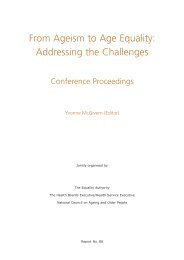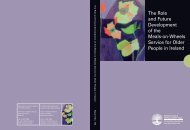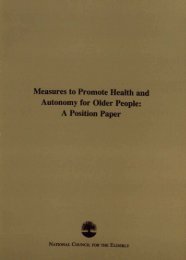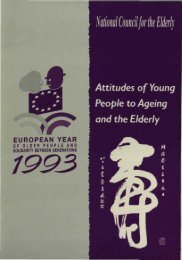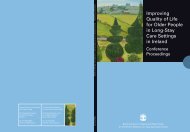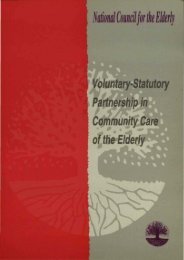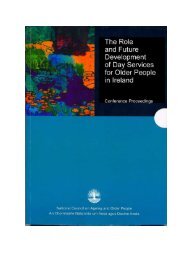Assessment of Older People's Health and Social Care Needs and ...
Assessment of Older People's Health and Social Care Needs and ...
Assessment of Older People's Health and Social Care Needs and ...
- No tags were found...
Create successful ePaper yourself
Turn your PDF publications into a flip-book with our unique Google optimized e-Paper software.
--------------------------------Questions about Rating ScalesIn looking at the rating scales that may be used in old age psychiatry, there are questions to ask.The first is why are we using the rating scale? The second is what is the purpose <strong>of</strong> it?Is it for population screening, assessing the severity <strong>of</strong> problems, aiding diagnosis, or monitoringchange if medication has been instituted? In terms <strong>of</strong> assessing the severity <strong>of</strong> problems <strong>and</strong>monitoring change, nothing can surpass the clinical interview with the individual <strong>and</strong> talking to his orher carer. Nonetheless, rating scales can be useful for other reasons, for example, to research anarea <strong>of</strong> illness or disease or to have a clear measurement <strong>of</strong> change.Rating Scales for Depression <strong>and</strong> DementiaThere are many scales available for depression <strong>and</strong> dementia. For example, the Geriatric DepressionScale or the BASDEC can be used to screen for Depression. The Hamilton rating scale can be used toassess the severity <strong>of</strong> depression. The Mini Mental Score Exam (MMSE) can be used to screen fordementia behavioural <strong>and</strong> psychological symptoms can be assessed using the Behave-AD scale <strong>and</strong>the activities <strong>of</strong> daily living can be assessed using the BristoljADFACS scales.Camberwell <strong>Assessment</strong> <strong>of</strong> Need for the ElderlyThe Camberwell <strong>Assessment</strong> <strong>of</strong> Need for the Elderly is a tool that is used for assessing the needs <strong>of</strong>elderly people with mental illness, be it in the community or in institutional care. It is used ininterviews with the older people, their carers <strong>and</strong> a staff member, if relevant. It is a valuable tool touse in assessing needs that are met, partially met or unmet in that, from the clinical point <strong>of</strong> view,service needs can be quantified <strong>and</strong>, from the planning point <strong>of</strong> view, you can determine whatservices need to be planned for an area.The tool addresses a broad range <strong>of</strong> areas which include accommodation, food, household skills, selfcare,daytime activities, physical health, psychotic symptoms, information <strong>and</strong> psychological distress,safety, support, behaviour, memory <strong>and</strong> finances.The Camberwell <strong>Assessment</strong> <strong>of</strong> Need for the Elderly tool is recommended for use in the singleassessment process in the National Service Framework for the Elderly in the UK. It certainly would bea good tool to use in assessing the met <strong>and</strong> unmet health <strong>and</strong> social care needs <strong>of</strong> the olderpopulation here also. There are a range <strong>of</strong> outcome tools which could be used to assess effectiveness<strong>of</strong> service provision e.g. HONOS, FACE.Conference Proceedings







